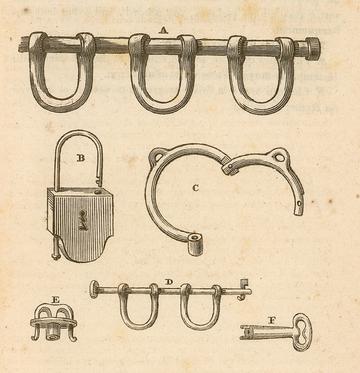The Kenneth Kirkwood Day 2024: Slavery
Saturday 9 March, 9.45 - 16.15
9.45 - 10.30 Coffee and Welcome
10.30 Talks begin
Entry via the South Door on Robinson Close, off South Parks Road.

Tickets
In-person: Members £30, Non-members £40 (includes lunch and refreshments)
Online: Members £10, Non-members £15 (NB. Only Talks 1, 3 & 4 will be filmed.)
Please note that tickets are also available to buy in the shop. Alternatively you can ring the Museum on 01865 613000 or email membership@prm.ox.ac.uk and reserve a place and either send a cheque or pay on the day. All places do need to be booked in advance, so that we are aware of catering requirements.
Since its inception 24 years ago, the annual Kenneth Kirkwood Day looks at key issues affecting society and by extension, the Museum. Four eminent speakers, all experts in their own field, speak about the topic, looking at it from the angle of their own expertise.
Following on from the successful 2023 event which covered the theme of migration, the discussion this year will be on slavery through the ages, including global modern-day slavery and servitude.
Speakers
Speaker 1: Dr Camilia Cowling
Dr Cowling is Associate Professor of Latin American History at the University of Warwick. Her work has focused on the history of slavery and emancipation in Cuba and Brazil. Her publications include Conceiving Freedom: Women of Colour, Gender and the Abolition of Slavery in Havana and Rio de Janeiro (University of North Carolina Press 2013) and The Care of Children in Atlantic Slave Societies, co-edited with Diana Paton, Maria Helena Machado and Emily West (Routledge 2020). Her talk is based on work for her book in progress, Bound Journeys, Freedom Places: Slavery, Human Movement, Gender and Race in Nineteenth-Century Cuba.
Title: Journeys of Enslavement and Resistance in Nineteenth-Century Cuba: Teresa Mina's Story
One day in 1854, in the city of Cienfuegos on Cuba's south-west coast, a West African woman walked into the office of a Spanish colonial legal representative and claimed she had been wrongly enslaved. In Cuba, both slavery itself and the Atlantic slave trade were booming, fuelled by the explosive growth of the sugar economy in the nineteenth century. Long after Teresa had endured the torments of an Atlantic slaving voyage from the African coasts, forced movement had continued to characterise her life in slavery on this largest of Caribbean islands. She joined the hundreds of thousands of others who suffered exhausting journeys, often travelling hundreds of miles, on foot, by ship, and probably on the colony's pioneering railways. Teresa's case allows us to glimpse what these journeys might have been like and what was at stake for the women, men and children coerced into them. Yet it also shows how enslaved people could use the same routes and transport mechanisms to resist their enslavement.
Speaker 2: Dr Doreen Kembabazi
Dr Kembabazi is Assistant Professor of African History and Medical Humanities, Department of History, University of Warwick. She is a historian of 19th and 20th century Africa and holds a PhD from the University of Michigan, Ann Arbor, USA. Her work addresses the themes of political culture, nationalism, state violence, ethnicity, civil society, slavery, gender and sexuality, medicine and public health, urbanisation and cosmopolitanism. A native of East Africa, Dr Kembabazi has an extensive teaching career that began in 2006 in East Africa and continued to be nurtured in the USA and Europe, where she has taught African and European history.
Title: The Aftermath of Slavery in Uganda, East Africa
Although slavery has a long afterlife (the Americas, Caribbean, or many parts of Africa), there are no discernible remnants of slavery: no slave memorial architecture, and no identified slave descendant communities in Uganda today. On the East African coast, the politics and social struggles around slave emancipation as well as the afterlife are known. In the interior of East Africa, in Uganda, formerly enslaved people seem to have simply melted into society, leaving no traces. I examine the aftermath of slavery, the social and political legacies of slavery in Uganda.
13.00 - 13.50 Lunch
Speaker 3: Jeremy Hunter
Jeremy Hunter is a UNESCO award-winning investigative photo-journalist, television producer, writer and speaker on contemporary and global issues. In an extensive media career he has reported from seventy countries across five continents, and before lockdown was commissioned to research and travel the slave routes of the former Kingdoms of Dahomey and Gold Coast. With the support of the Government of Benin, he is currently working on bringing to the screen the harrowing story of the Clotilda, the last ship to carry enslaved Africans from Ouidah to the United States in 1860.
Title: The Brooks and the Atlantic Slave Trade: Travels through the Slave Routes of the Former Kingdoms of Dahomey and Gold Coast
The iconic image of the Brooks is used as a visual metaphor and focus point to illustrate the stories of the relationships between slave traders and owners - and the enslavers, specifically the tribal kings of the region. This highly visual presentation describes the slave routes forced upon the enslaved between West Africa, the Middle Passage and the Caribbean, and life on board the slave-ship Brooks.
Speaker 4: Andrew Smith
MA in Contemporary Slavery, University of Hull; Manager of ACTion to Combat Modern Slavery Justice Hub; Coordinator of Humber Modern Slavery Partnership; Wilberforce Institute.
Title: Modern Slavery, Hidden in Plain Sight or a Venial Side Effect of Globalisation?
This presentation will examine the scale and nature of modern slavery in the UK with practical examples of efforts made to tackle the issue. It will cover key legal provisions available to professionals, and the accepted and theoretical causes for modern slavery linking to the dichotomy between abolitionist and critical viewpoints. This presentation will look at the theory of the 'ideal environment' in which modern slavery is allowed to flourish.
The Members of the Pitt Rivers Museum (formerly the Friends) have helped to fund projects and acquisitions, and have supported the purchase of display cases and important conservation work. The vital and much-needed fundraising carried out by the Members includes the annual Kenneth Kirkwood Day which is used as a fundraiser to give staff bursaries for travel and research. To find out more about the Kenneth Kirkwood Fund, see here.


